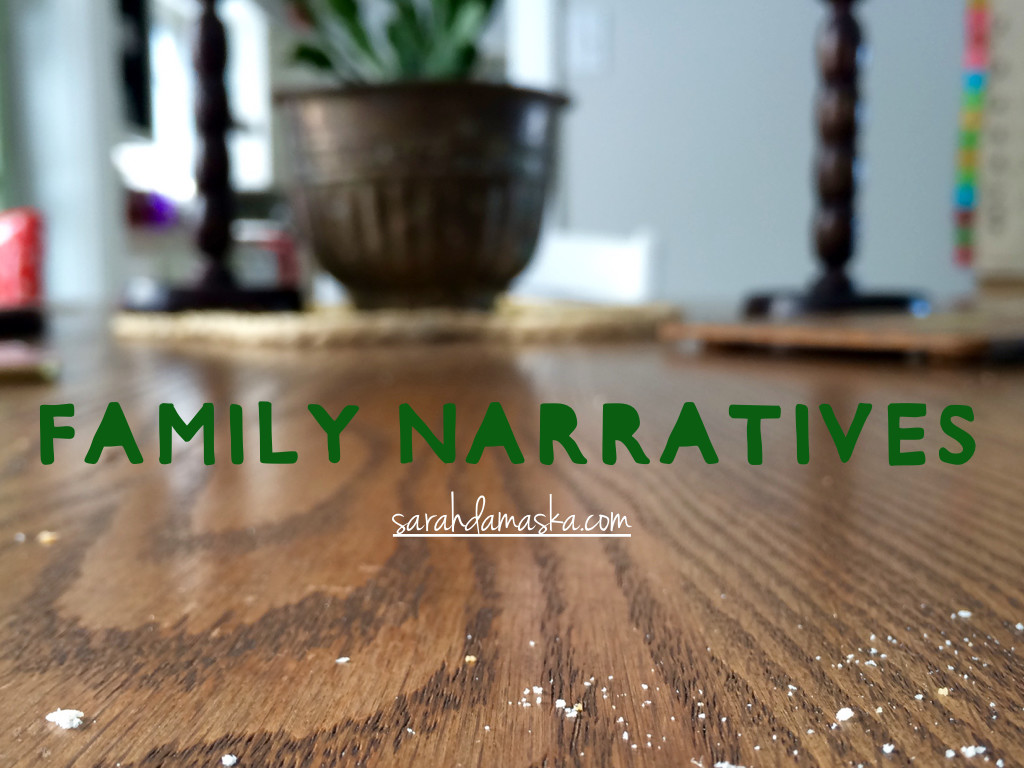
A few weeks ago, my aversion to answering phone calls from unknown numbers led to this bizarre story. When a number pops up on my phone that I don’t recognize, I am not ashamed to let it go to voicemail. It’s the introvert in me, I suppose. Or maybe it’s the part of me that doesn’t like surprises. Also, it’s usually junk and who has time for that? At any rate, the other day I saw a number from out of state and I promptly ignored it. To my surprise, there was a voicemail from a stranger and when I listened, well, this is what I heard:
Please take a good moment to chuckle and to wonder why this woman would leave a voicemail after listening to a message in my voice, stating my name. Now, because my brain must process All The Things, I cannot quit thinking about this voicemail.
You see, I think there’s a narrative that our families tell. Our families, the ones we share the most words and space with, have a collective story we’re telling one another and the outside world.
Peter’s mother (just to be clear— this is not my mother-in-law, even though I’m married to a Peter, too!), bless her soul, did not expect me to hear her voicemail. Admittedly, I don’t know anything about her beyond her 26 second message. But from her words, I can make a few assumptions (which may or may not be true):
1. Peter does not usually get gifts to his mother on time.
2. Peter has not talked to his mother since Christmas.
3. Peter did not see his mother for Christmas.
4. Peter’s mother may love her son, but she does not tell him.
5. Peter’s wife, Marian, does not help him send things.
There’s this thing that Carey Niewhof calls “family voice”. He says, “It contains hints of expectation, exasperation, frustration and quiet fatigue. Add in tones of command, whining and a touch of rudeness, and you’ve got family voice. Sometimes it’s strong. Sometimes it’s subtle. But all the time it’s reserved for the people you live with.” (source)
I wouldn’t be human if I didn’t admit I know exactly what he’s talking about. There’s a certain way we communicate with those in our family that we wouldn’t dare talk to others. Often when this happens, I make excuses: They’re my family. I can be real with them. I have to have somewhere I can be completely honest.
But is that the kind of narrative I want to tell? Is that the kind of legacy I want to leave? When I think of my kids, after they’re married and on their own, what kind of relationship do I want to have with them? What would my voicemail say?
I’ve been reading the book of Ruth, one of my very favorites. Naomi and her husband and two sons move from Bethlehem to Moab because of a famine. While there, her husband dies, her sons get married to Moabite women and then they die, too. It’s a story of extreme loss and bitterness… and, my favorite, redemption. Naomi, alone in Moab, decides to return to Bethlehem and urges her daughters-in-law to stay and find a new love and life. One daughter agrees and moves on, but Ruth refuses to abandon Naomi. You’ve probably heard the words she declared:
But Ruth replied, “Don’t ask me to leave you and turn back. Wherever you go, I will go; wherever you live, I will live. Your people will be my people, and your God will be my God. Wherever you die, I will die, and there I will be buried. May the Lord punish me severely if I allow anything but death to separate us!” When Naomi saw that Ruth was determined to go with her, she said nothing more.
Ruth 1:16-18
Their family narrative was one of loss and abandonment, but in the midst of the sorrow, Ruth chose to change the family narrative. While her mother-in-law was bitter, Ruth was hopeful. And slowly, over time, the plan for their family unfolded and it was beyond what anyone had imagined. Eventually in their family line came a baby boy who would be named King David, and later, the True King, Jesus. Ruth rewrote her family’s voice. She followed Naomi, even though it was no personal gain for her at the time. She had no guarantees that her life would ever rise above poverty and hardship, but she refused to believe the narrative that had been handed to her.
It’s a powerful lesson, isn’t it?
I sit at the dinner table, after serving the food that inevitably someone will be made to choke down because they don’t like it. We iron out the disagreements that happen like clockwork: who gets to sit in the polka dot chair, who gets the pink plate, who gets to pray. Someone will look at someone with the wrong face. Someone will chew with their mouth open, which will send another child into a deluge of unnecessary comments. They will leave the table and I will clean up the crumbs, wondering just where I went wrong.
However, my voice sets the tone for our family. My voice rises to the top as I tell our narrative. And it may not seem like it’s making a difference, but it does, little by little. When I speak over my children, using Truth, believing that there is hope right in the middle of our mess, I’m building our narrative. When I fail, it’s important that I’m real with my family, asking for forgiveness.
Because someday, when I inadvertently leave a voicemail on a stranger’s phone, I want them to know that I deeply love my children. That I delight in them. I want my words to bring out the best in my kids.
May you have the space today to step back and see how the Holy Spirit is guiding you as you build your Family Narrative. May you have the courage to change the voice of disrespect and negativity and replace it with hope and delight. You may feel like you had little control as a child what narrative was spoken over you, but there is One who can change that story, who will rewrite history for you. And may you send your Mama a gift on time, to prove to her that you’re not always late.


Thank you Sarah! Oh yes, I laughed at the voicemail. However, I then had to think about the messages I leave. I wonder if my words convey the love I have for my family…today I will be deliberate because of this reminder. I pray this truth penetrates my heart for a lifetime.
Of course, I laughed at the voicemail. And then I did a little looking inside myself. Thanks for such a great reminder!
🌟💛🎺💐💕😇
Thank you Sarah! I truly look forward to more❤️ I admit these days u have not much time for reading nor have I ever been much of one but when I read your blogs I relate, enjoy, and can’t stop reading❤️ Thank u